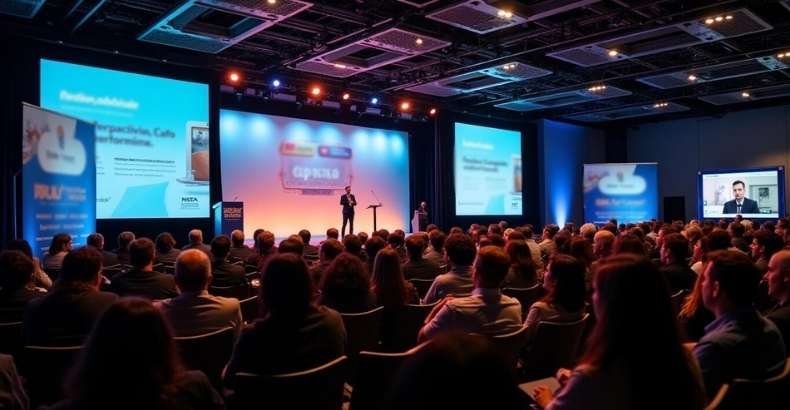Your cart is currently empty!

Healthcare conferences gather professionals from various sectors to discuss the latest trends and advancements in the industry. These events provide a platform for learning, collaboration, and sharing ideas. You might be wondering, “What are the networking opportunities at a healthcare conference?”
Networking opportunities at these conferences are abundant. Attendees can connect with industry leaders, participate in interactive workshops, and engage in discussions during panel sessions. There are often dedicated networking events, such as receptions and roundtable discussions, allowing for more personal interactions.
Are you curious to learn more about what these networking opportunities entail? This article will provide a deeper insight into the various ways you can connect with other professionals and maximize your experience at a healthcare conference.
How Important Is Networking at Healthcare Conferences?
Networking at healthcare conferences is crucial for professionals in the field. Events held in Canada, for example, often attract a diverse group of participants, including clinicians, researchers, and policymakers. Attending international healthcare conferences in Canada creates opportunities for collaboration and knowledge sharing, enhancing professional growth.
In the dynamic landscape of healthcare, staying informed about the latest trends and advancements is essential. Networking helps professionals stay connected with emerging ideas and practices, which can positively impact their careers and organizations.
Furthermore, networking facilitates the exchange of ideas and experiences that can lead to innovative solutions for healthcare challenges. Building relationships during these conferences develops a sense of community among healthcare professionals. These connections often extend beyond the event, providing ongoing support and collaboration opportunities in their respective fields.
What Are the Networking Opportunities at a Healthcare Conference?
Networking opportunities at a healthcare conference come in various forms, each offering various benefits for attendees. Knowing these opportunities can help you make the most of your experience. Here are some common networking opportunities you can expect.

Keynote Sessions
Keynote sessions often feature industry leaders and experts sharing their insights. Attending these presentations allows you to engage with the speaker and fellow attendees interested in the same topics. After the session, consider approaching the speaker or participants to discuss their insights further. These conversations can lead to valuable mentorship opportunities or collaborations in the future.
Workshops
Workshops provide hands-on learning experiences and opportunities for interaction. These smaller group settings encourage discussion and collaboration among participants. Take advantage of breaks to connect with others, exchange ideas, and share contact information. Participating actively in these sessions can enhance your knowledge and develop deeper connections with your peers.
Panel Discussions
Panel discussions often feature multiple experts discussing relevant issues in healthcare. Engaging with panelists after the session allows you to ask questions and gain different perspectives. Networking during these discussions can help you connect with others who share your interests. This exchange of ideas can inspire new approaches to challenges you face in your professional practice.
Networking Events
Many conferences host dedicated networking events, such as receptions or social gatherings. These informal settings encourage attendees to mingle and discuss shared interests. Make sure to participate actively and introduce yourself to others to expand your professional network. Attending these events can help you build relationships that may benefit your career in the long run.
Exhibit Halls
Exhibit halls are great places to network with vendors, sponsors, and other professionals. Take time to explore the booths and engage in conversations about the latest products and services in healthcare. Collect business cards and ask questions to establish connections. These interactions can provide insights into industry trends and potential partnerships that can upgrade your practice.
Social Media Interaction
Many conferences use social media to facilitate networking before, during, and after the event. Engaging with the conference’s official social media accounts can help you connect with other attendees. Use event hashtags to share your experiences and interact with fellow participants. By actively participating online, you can keep the conversation going and strengthen your professional network beyond the conference.
Follow-Up Opportunities
After the conference, continue networking by following up with new connections. Send personalized messages or emails to express your appreciation for their time and insights. Maintaining these connections can open doors for future collaborations and partnerships.
Tips for Effective Networking During a Healthcare Conference
Effective networking at a healthcare conference requires planning and preparation. Here are some tips to help you make the most of your networking experience.
- Prepare Your Introduction: Before the conference, prepare a brief introduction that highlights your background and interests. Keep it concise and engaging to capture the attention of others. Practicing your introduction will boost your confidence when meeting new people.
- Set Networking Goals: Establish specific goals for your networking efforts. Decide how many new contacts you want to make or which individuals you hope to connect with. Having clear objectives can keep you focused during the conference.
- Bring Business Cards: Always carry business cards to share with new contacts. A business card is an effective way to provide your information and make a memorable impression. Ensure your cards are up-to-date and have accurate contact details.
- Be Approachable: Maintain an open and friendly demeanor when networking. Smile and make eye contact to create a welcoming atmosphere. Being approachable encourages others to engage with you.
- Listen Actively: Listening is a crucial part of effective networking. Show genuine interest in what others have to say by asking questions and engaging in the conversation. Active listening builds rapport and helps promote meaningful connections.
- Follow-Up After the Conference: After the event, take time to follow up with the contacts you made. Send a personalized message to thank them for their time and reference any specific conversations you had. This follow-up helps solidify your connection and opens the door for future communication.
Effective networking at a healthcare conference is essential for making valuable connections. As you plan the event, keep in mind the cost to attend a health care conference, as this can influence how you allocate your resources to maximize every opportunity for engagement. Listening actively and following up after the conference ensures that connections are maintained, paving the way for future collaborations.
What Should You Consider for Attending a Healthcare Conference?
Before attending a healthcare conference, consider various factors to ensure you make the most out of your experience. The below considerations will help you plan effectively and align the conference with your personal and professional goals.

Goals
Reflect on your objectives for attending the conference. Are you looking to learn about new trends, network with professionals, or find solutions to challenges you face? Setting clear goals will guide your experience and help you choose the sessions that will provide the most value. Clearly defined goals can also motivate you to actively participate in discussions and workshops.
Budget
Determine your budget for attending the conference, including registration fees, travel, accommodation, and meals. Knowing your financial limits will help you make informed decisions about which conferences to attend. Additionally, budgeting wisely allows you to allocate funds to the most critical aspects of your trip. Keep in mind potential additional expenses like materials, networking events, or social activities.
Location
Consider the conference location and whether it is easily accessible for you. Check travel options and accommodation availability in the area to ensure a smooth experience. A well-located conference can reduce travel stress and maximize your time for networking and learning. Also, consider local attractions or amenities that may improve your overall experience during the event.
Schedule
Review the conference schedule to see if it aligns with your availability. Ensure you can attend the sessions and events that matter most to you. A well-planned schedule helps you prioritize your time effectively during the conference. Additionally, be flexible and open to adjusting your plans based on emerging networking opportunities or interesting sessions.
Networking Opportunities
Look for events that provide networking opportunities. Engaging with other attendees can enhance your experience and lead to valuable connections, particularly when you explore networking opportunities for healthcare professionals at these events. Make a point to attend dedicated networking sessions or social events to maximize your interactions. Follow up with the connections you make to build lasting professional relationships.
Content Relevance
Make sure the topics covered at the conference align with your interests and professional goals. Attending sessions that are relevant to your work will provide the most value. Engaging with material that resonates with your career aspirations can lead to greater insights and practical applications.
How to Follow Up After Networking at a Healthcare Conference?
Following up after a healthcare conference is crucial for maintaining the connections you’ve made. A thoughtful follow-up strategy can help solidify relationships and support ongoing professional interactions. The following tips will help you follow up after networking at a healthcare conference:

Send Thank-You Messages
Reach out to new contacts with a thank-you message. Express your appreciation for their time and insights during the conference. A simple gesture can leave a lasting impression and pave the way for future conversations.
Connect on Social Media
Find your new contacts on professional social media platforms like LinkedIn. Sending connection requests helps you stay in touch and keep the conversation going. Engaging with their posts can also help you maintain visibility in their professional circles.
Share Relevant Resources
If you come across articles, studies, or resources that align with your discussions, share them with your new contacts. This shows that you value the connection and are invested in maintaining it. Sharing helpful information can strengthen your bond and position you as a resource.
Plan Future Meetings
If appropriate, suggest a follow-up meeting or coffee chat to continue your discussions. This can strengthen your relationship and lead to further collaboration. Building deeper connections can open doors to new opportunities and partnerships in the future.
Frequently Asked Questions (FAQs)
This section addresses common questions related to networking at healthcare conferences. Building valuable connections in your field is easier if you understand these aspects.
What Are the Best Networking Strategies at Healthcare Conferences?
The best networking strategies include preparing an elevator pitch, bringing business cards, and engaging actively in conversations. Set specific networking goals before the event, which helps you stay focused on who you want to meet. Additionally, practice your introduction to make a strong first impression.
How Can I Make Meaningful Connections?
To make meaningful connections, engage in active listening, ask open-ended questions, and show genuine interest in others’ experiences. Taking the time to understand what others have to say can help you form a deeper relationship. Following up after the event is also crucial for solidifying these connections.
How Can I Prepare for Networking at a Conference?
Prepare by researching attendees, practicing your introduction, and setting clear goals. Familiarize yourself with the conference agenda and identify sessions that provide networking opportunities. Create a list of people you want to connect with and the topics you’d like to discuss.
What Should I Do If I Feel Shy About Networking?
If you feel shy about networking, start by engaging with smaller groups or one-on-one conversations. Setting small goals for meeting people can help ease anxiety and build confidence. Practice your introduction beforehand, so you feel more comfortable when the time comes to speak.
How Do I Follow Up After Making Connections?
Follow up by sending a thank-you email or message shortly after the conference. Mention specific conversations you had to personalize your message and show that you remember them. Keeping the lines of communication open will help strengthen the connection over time.
Final Thought
Networking is a vital component of healthcare conferences, offering attendees the chance to build valuable relationships. These connections can lead to collaborations that boost professional development and promote innovative solutions in the healthcare field. Engaging with others opens doors to new opportunities and insights.
So, what are the networking opportunities at a healthcare conference? They include interactive workshops, panel discussions, and dedicated networking events designed for meaningful interactions. These sessions provide a platform for professionals to share experiences, exchange ideas, and establish partnerships that can benefit their careers.

Leave a Reply